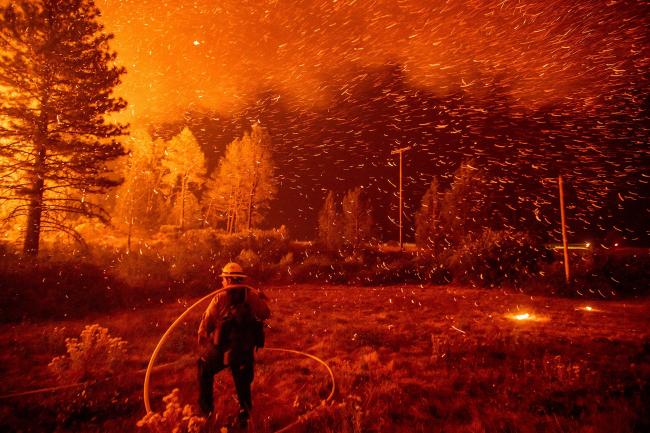Articles Menu

As fires rage in California, the permafrost melts in Siberia, heat waves strike Europe, and hurricanes and typhoons grow ever stronger, there is an urgent need for ambitious climate action. The question is what it will look like, and who will bear the burden of a transition to a more sustainable world.
For several decades now, the dominant environmental messaging to the public has been about individual action. We were told that to solve the climate crisis, we needed to change our lightbulbs, switch to energy-efficient appliances, buy hybrid or electric vehicles, better insulate our homes, stop using plastic bags, and alter our personal consumption in other ways.
These things are undoubtedly positive changes, but they are not enough to address the scale of the crisis we face and they can lead to perverse conclusions about where the blame for the climate crisis truly lies.
There is a growing argument that one of the driving forces of the climate crisis is the global population. The world is overpopulated, these people say, and that is why emissions are so high. This view is most commonly expressed by eco-fascists, who believe a genocide is needed to reduce the human population. But overpopulation has also been cited by leading liberal figures such as primatologist Jane Goodall and naturalist Sir David Attenborough, helping to fuel misleading and troubling conclusions about what is fuelling climate change.
While focusing on personal consumption places the responsibility on all of us somewhat equally, focusing on population growth shifts the blame to countries in Africa and Asia where populations have continued growing in recent decades. Yet these people have among the lowest carbon footprints in the world, and when we look at which jurisdictions have emitted the greenhouse gases that are warming the planet, the answer is definitive: the United States and Europe.
But even blaming it wholly on Americans and Europeans is missing the bigger picture. A new Oxfam report finds that the richest 1% of people alone are responsible for double the emissions of the poorest 50% of the global population. That means that even if the working class of the Global North took all the individual actions that are recommended or we forced poor people in the Global South stop having kids, that still wouldn’t solve the problem.
Our remaining carbon budget is being sacrificed so the global elite can keep their lavish lifestyles, while they take private jets to climate conferences so they can give the impression they care. Virgin founder Richard Branson has been a leader in this billionaire greenwashing, making climate pledges he didn’t follow through on while expanding his airline business. Similarly, Elon Musk claims to care about the climate to sell more automobiles, while criticising public transit and trying to stop high-speed rail projects.
But maybe the most prominent of these billionaires who greenwash their unsustainable activities is Jeff Bezos. Earlier this year, the Amazon CEO was lauded in the press for his $10 billion Bezos Earth Fund — he even bought the rights to rename a Seattle stadium after his Climate Pledge! But no grants have yet been issued from the fund, while Amazon continues to help oil and gas companies more efficiently extract fossil fuels.
These billionaires assert that capitalism can solve the climate crisis, and their investments are helping to create a new form of “green capitalism” that will reduce emissions and usher in a sustainable future. Governments are also falling for this myth and putting it at the centre of their pandemic recovery plans.
In July, the British government announced a £350 million recovery plan to put the country at the forefront of “green innovation” – a drop in the ocean of the investment needed. Predictably, it included no suggestion of taking on the emissions of the wealthy by reducing their wealth, banning private jets, or winding down the polluting industries from which they profit.
Meanwhile, in the United States, President Donald Trump doesn’t have a climate plan, but even Joe Biden focuses on renewables and electric cars, while promising new highways with charging stations and refusing to ban fracking. To their north, Prime Minister Justin Trudeau’s recent throne speech promised to make climate action a “cornerstone” of Canada’s pandemic recovery, while centring on electric vehicles, mining more components for them, and investing more in hydro power. He was silent on the environmental impacts of those initiatives.
Green capitalism will never facilitate the scale of action that is necessary to keep warming below 1.5ºC or even 2ºC because it refuses to take on the powerful people and industries that are fuelling the climate crisis in the first place. It continues to ensure the benefits flow to the top while hollowing out the middle class and producing climate narratives which shift the burden of responsibility onto those who have little power to make the necessary changes: the public, if not the global poor.
The kind of climate action we need requires taking on the wealthy and organising around a vision for a different kind of society. That means not just making the rich pay higher taxes, but actively dismantling the economic structures that facilitate their wealth accumulation, treat the planet as an unlimited bounty of free raw materials, and generate all the emissions warming the planet.
Either we take on capitalism and its victors, or we’ll be unable to stop runaway climate change, help the climate refugees it will create, or stop the eco-fascist myth of overpopulation that will surge as a result. Our choice is socialism or barbarism, as Rosa Luxemburg once said. Green capitalism won’t save us.